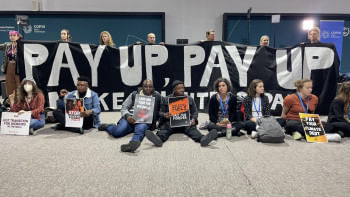‘International law is something more than a problem-solving tool'

Dr. Mohammad Shahabuddin is a Senior Lecturer in Law at Birmingham Law School, University of Birmingham, UK. He was the founder head of the Department of Law & Justice, Jahangirnagar University. His research and teaching interest covers histories and politics of nationalism, ethnicity, colonialism and human rights. He is the author of Ethnicity and International Law: Histories, Politics and Practices (Cambridge University Press, 2016). Emraan Azad from Law Desk talks to him on the following issues.
Law Desk (LD): How did you get interested in studying international law, more specifically on Third World Approach to International Law (TWAIL)?
Mohammad Shahabuddin (MS): It is quite ironic that I was introduced to TWAIL scholarship only during my PhD research at the School of Oriental and African Studies (SOAS), University of London, under the research supervision of a white Englishman. SOAS (initially SOS) was established as a training facility for British colonial officers. Although I had my basic legal education in the Third World, the curriculum was heavily dominated by European worldviews. In this sense, my training in critical engagement with international law and its imperialist projects came from an old imperial institution.
LD: Do did you think that Bangladeshi law schools are yet to produce good numbers of graduates who are desired to be knowledgeable enough in international law? What could be the reasons for the failure of our law schools?
MS: Bangladeshi law schools traditionally attract best quality students. How much intellectual support and mentoring (beyond conventional academic activities) these fantastic students receive during their time at law schools is a different question. But I believe the quality of law graduates is definitely much better than what happened to be the case 15 years back. I am informed that many of recent graduates made their way to top global institutions for further studies with specialisation in international law. Self-motivated learning with really limited resources is a signature quality of students in the Third World.
LD: Do you believe that our law schools should consider adopting new approaches in teaching international law? Would you suggest any teaching approach that we can practice for us?
MS: I think the more relevant need is to keep pace with recent developments in international law scholarship – both critical and orthodox. Orthodox approaches offer the necessary premise upon which critical scholarship can meaningfully develop. It is, therefore, imperative that students are well-informed of recent developments in international law as a whole.
It is quite paradoxical that most advanced research in alternative approaches, including Third World approaches, to international law got shaped in elite institutions of the developed world. Resource constraint is, of course, a practical problem for our law schools. But at the same time we need to acknowledge the lack of research initiatives and continuous professional development among academics. A vibrant research culture in law schools, if nurtured, will help develop and disseminate new research and teaching approaches to international law despite typical resource constraints. Macro- and micro-level institutional support is also necessary for creating an environment for research-led teaching that has the potential of transforming international law teaching in Bangladesh.
LD: As you regularly interact with Bangladeshi youth through teaching, do you see any change in thinking (on legal issues) of our generation? How would you evaluate their role for future Bangladesh which is believed to have huge potential to contribute in different areas of international law?
MS: Very recently in last July, I was a part of a workshop on 'Researching and Teaching International Law in the Third World' that was jointly organised by the Department of Law & Justice at Jahangirnagar University and the School of Law at the University of Birmingham. One of the most prominent TWAIL scholars - Professor Antony Anghie – also joined the initiative. This workshop brought together 25 young academics with interest in international law from 15 Bangladeshi public and private law schools. I was most impressed with the quality of their research and teaching practices. As a part of the Workshop, the participants were asked to come up with ideas for research and teaching collaborations that they themselves could initiate without any external help and within the existing resource and institutional constraints. They came up with an impressive list of creative ideas. This makes me optimist about the future direction of international law scholarship in Bangladesh. There are challenges ahead but I hope they learn from the frustrations of their senior colleagues and carve their own paths where necessary.
LD: If you are asked to inspire Bangladeshi law students who have a special feeling of interest for studying international law, how would you like to do that?
MS: In this increasingly complex global political, economic, and security landscape, international law is more pertinent than ever. This presents an immense opportunity before Bangladeshi law students. But they have to prepare well. To stand out in a crowded market, they need to think big. International law is something more than a problem-solving tool. Bangladeshi students should aim to bring their own life-experience in the Third World into their political imagination of the global order and the political roles that international law plays therein. With this added element of originality, legal scholarship in the able hands of future Bangladeshi international lawyers will go a long way.
LD: Many thanks for your time.
MS: You are welcome.


 For all latest news, follow The Daily Star's Google News channel.
For all latest news, follow The Daily Star's Google News channel. 



Comments